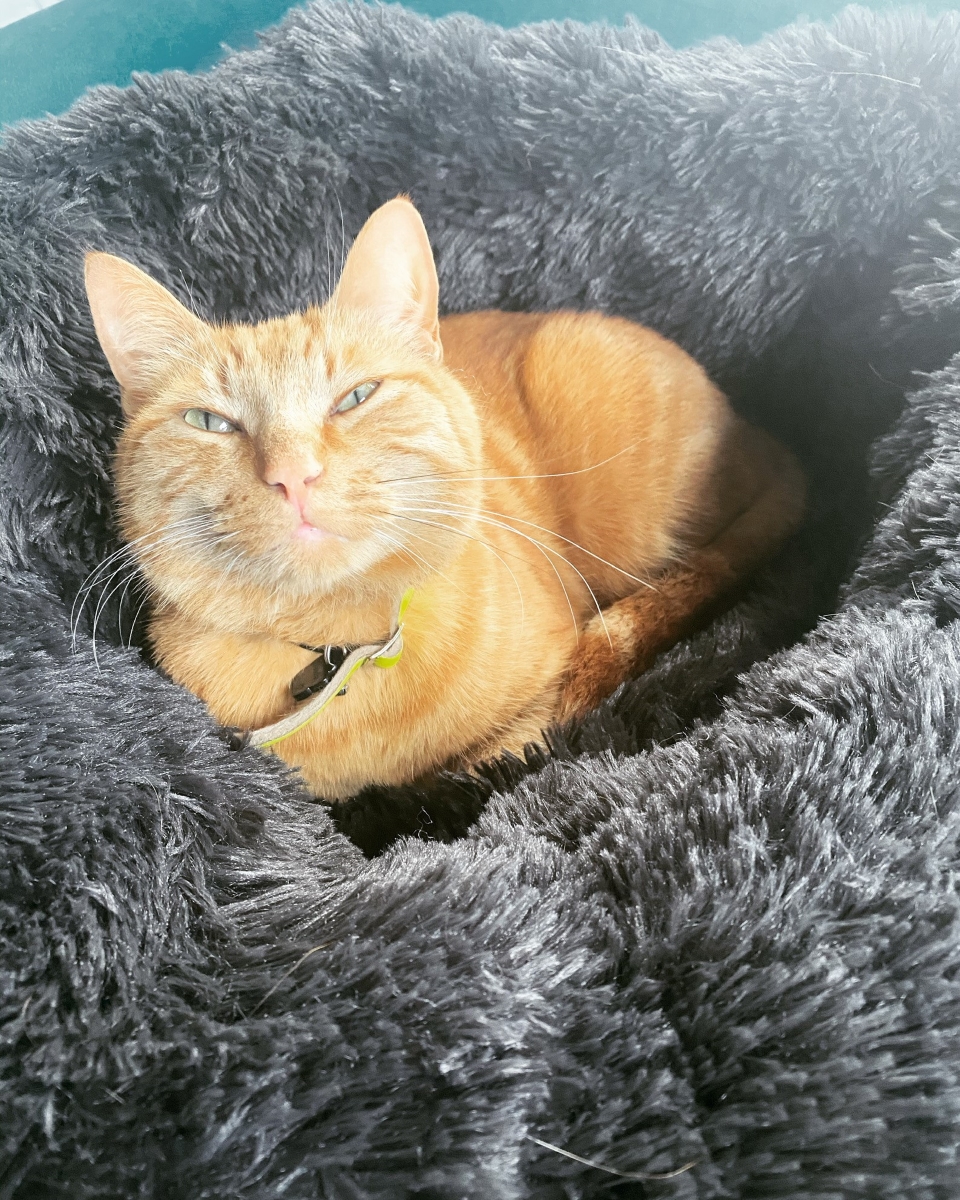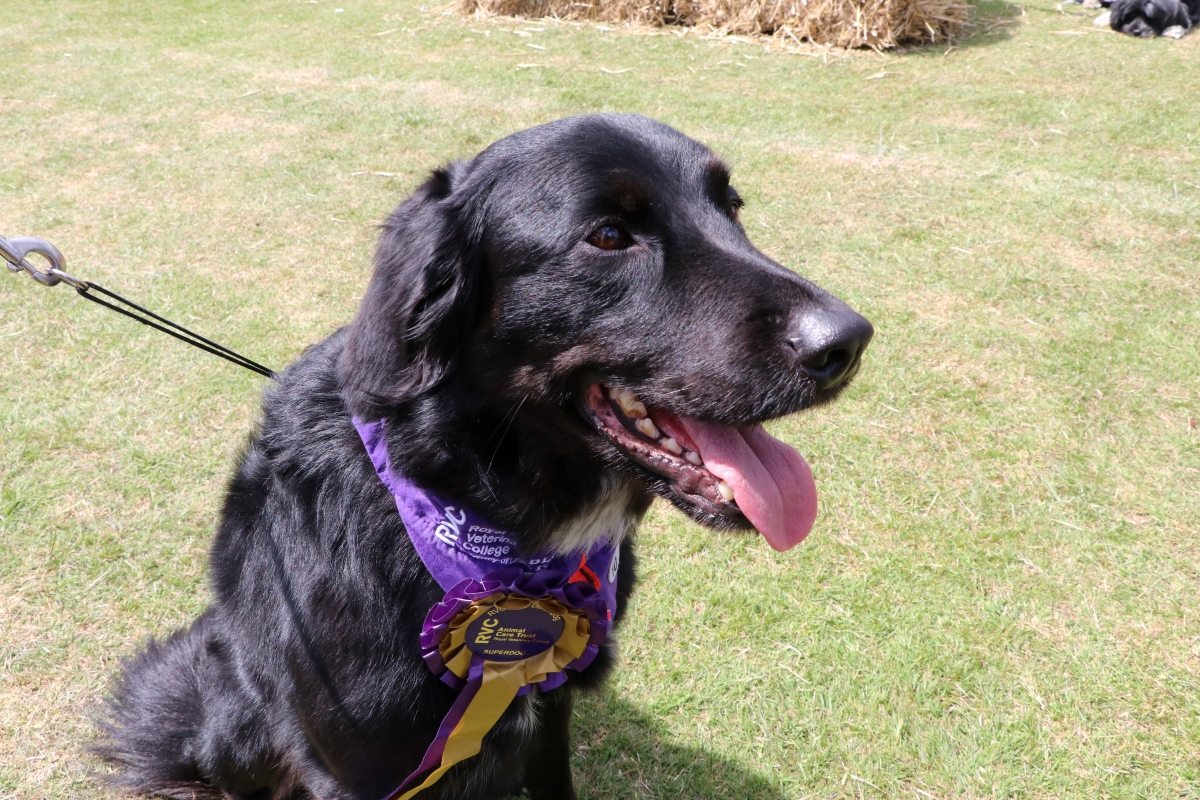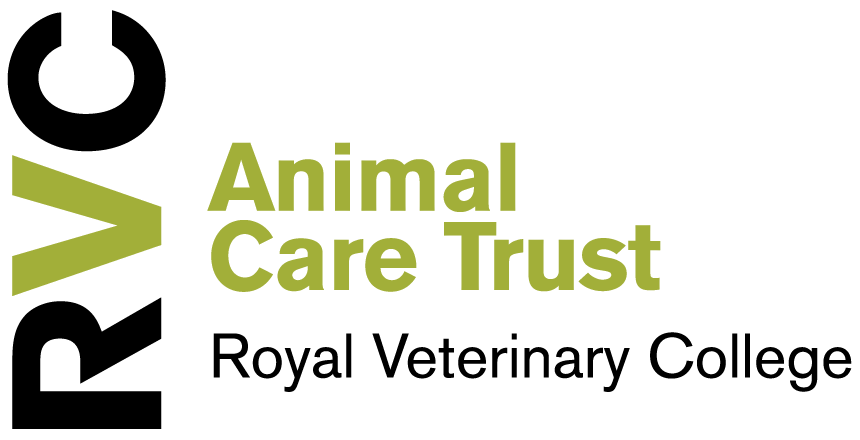Giving pets a new leash of life: The RVC announces “Pet Blood Donors of the Year” in celebration of World Blood Donor Day
This World Blood Donor Day (14 June) the Royal Veterinary College (RVC) is celebrating the amazing cats and dogs which form part of its vital blood donor programme. These pets and their families help save and treat hundreds of pets every year by voluntarily donating their blood to be used in operations and procedures. To mark the occasion, the RVC’s registered charity, the RVC Animal Care Trust, has awarded two families of canine and feline blood donors “Blood Donor of the Year” awards in recognition of their generous, life-saving donations.

The feline Blood Donor of the Year was awarded to Mandie and her Harry Potter namesake cat Weasley. Weasley, a five-year-old domestic shorthair has made ten life-saving donations since signing up in 2018 after Mandie had spotted an appeal for donors whilst waiting at the RVC’s Small Animal Hospital for treatment for Weasley.
Mandie, owner and recipient of the Feline Donor of the Year award, said:
“As a nurse myself, I understood the importance of donating and it just made perfect sense to me to sign him up. We are a nation of animal lovers and it’s just such a thrill being able to help another animal in need.
Mandie is incredibly proud of Weasley’s award and is determined to help raise awareness of the importance of pets donating blood saying:
“Not enough people know about animal, especially feline, donors. Weasley is an absolute hero! He is so comfortable donating and looks out for Spock, our English pointer who also donates. The team give him a thorough health check and take blood, all while giving him lots of fuss and attention- he loves it!”
The Blood Transfusion team are so professional and amazing at keeping the pets calm. They assess them first and see if their temperament is suitable and they won’t be unduly stressed. Weasley has been so chilled so he definitely was an ideal candidate! They’ve also been great with us and dealing with any worries we’ve had as owners- it’s often been just like parents, where we are more worried than the child!”
The Canine Blood Donor was a six -year-old super-collie called Spike who joined the RVC Blood Transfusion service in April 2019 and has since donated 13 times.
Katie Matthews, daughter of Spike’s owner Pauline, recipient of the Canine Donor of the Year award, said:
“Mum saw an appeal online asking for blood donors, and particularly this breed, so he went in for some tests to check that he was suitable and he’s been going in ever since. He absolutely loves donating! Even through lockdown when we couldn’t go into the hospital with him, he would skip in to see his favourite nurse without a thought for us waiting outside!”
“It’s such a rewarding service to be a part of and we love hearing from families whose pets have been saved thanks to Spike’s blood. We received one letter at Christmas and it was one of our favourite gifts that year.
One patient, a springer Spaniel called Harry, needed 4 blood transfusions earlier this year for Immune mediated thrombocytopenia. Treatment is ongoing but we’re pleased to report that he responded well and that’s with huge thanks to Spike and his precious donation of blood”

With more than 200 heroic dogs and cats saving lives through the RVC Blood Donation programme, the pioneering scheme has helped save hundreds of critically ill animals since it’s conception in 2005 carrying out almost 700 transfusions over the last year. RVC feline blood product transfusions have doubled this year to 130. We have conducted 516 canine blood product transfusions and 50 xenotransfusions (canine blood being given to cats in emergencies). Blood donations were used for 45 cases requiring eye serum treatments.
Thanks to the generosity of its Blood Donor families, the service has been able to ensure the animal hospital has the essential blood it needs to support the wide range of complex and life-saving operations and treatments that take place at the RVC every day.
Charlotte Russo, Head of Transfusion Medicine Nurse at the RVC, explains:
“ We always need more feline donors - big happy relaxed cats! We are also always looking for more blood group ‘negative’ canine donors - so Dobermans, greyhounds, flat coat retrievers, German Shepherd and ‘Staffies’ are often ideal. As always, if someone has a big happy relaxed dog of any breed and they meet the requirements – we would very much welcome them!”
The blood donation service is voluntary, with the RVC and Animal Care Trust relying on the goodwill of local pet owners who bring their pets to donate blood. All donors are given health checks prior to donating and receive a full blood screening annually free of charge. Donors are also provided with a special blood donor tag to recognise their support, and each receives a special gift when they retire.
The blood transfusion team is always looking for more dogs and cats to begin donating and saving lives through the programme. If you think your pet could be an RVC superhero, please contact the RVC Blood Donor team for further information: www.rvc.ac.uk/act/blooddonors
Notes to Editors
For more information please contact:
- Jasmin De Vivo (jasmin.devivo@plmr.co.uk)
- Press Line: 0800 368 9520
About the Royal Veterinary College
- The Royal Veterinary College (RVC) is the UK's largest and longest established independent veterinary school and is a Member Institution of the University of London.
- It is one of the few veterinary schools in the world that hold accreditations from the RCVS in the UK (with reciprocal recognition from the AVBC for Australasia, the VCI for Ireland and the SAVC for South Africa), the EAEVE in the EU, and the AVMA in the USA and Canada.
- The RVC is ranked as the top veterinary school in the world in line QS World University Rankings by subject, 2022.
- The RVC offers undergraduate and postgraduate programmes in veterinary medicine, veterinary nursing and biological sciences.
- A research led institution with 88% of its research rated as internationally excellent or world class in the Research Excellence Framework 2021.
- The RVC provides animal owners and the veterinary profession with access to expert veterinary care and advice through its teaching hospitals and first opinion practices in London and Hertfordshire.
- Our registered charity, The RVC Animal Care Trust, is dedicated to improving animal health and care. They do this by supporting three key areas; improving and enhancing hospital equipment and facilities, funding pioneering research into treatments for animal and human disease, and we support the education of veterinary professionals and scientists. Find out more about their important work and how to get involved here: https://www.rvc.ac.uk/act/about-us

